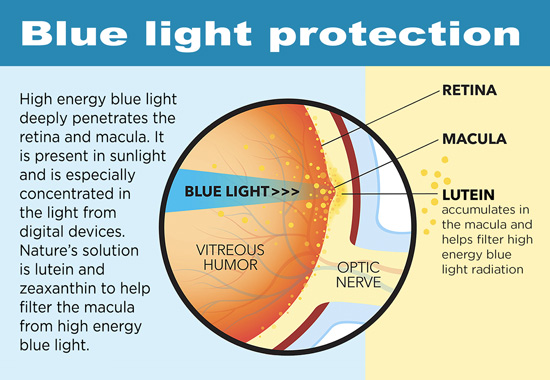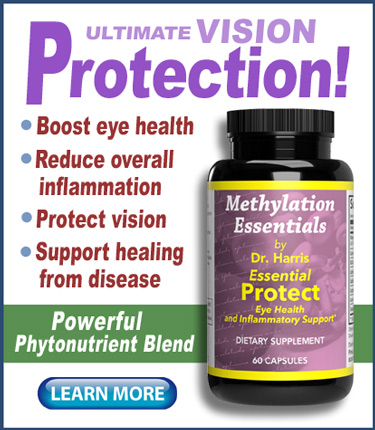We live in an era that could be described as a blue light total onslaught. The damaging blue light—light that has shorter wavelengths and higher energy than other colors—comes from excessive exposure to cell phones, computers, tablets, t.v.’s and LED lights.
Fortunately, a new study has shown that lutein supplements can provide the support the eye needs in as little as two weeks.
The study showed another popular eyesight support nutrient, zeaxanthin, also produced a sizable increase in its serum concentration—though it took substantially longer to accomplish.
Previous research
Lutein is recognized for its blue light filtering and antioxidant properties, most notably in the retina. Research has shown that when lutein is eliminated from the diet of experimental animals early degenerative signs appear in the retina. Meanwhile patients with an acquired condition of macular pigment loss show serious visual handicap, indicating the importance of macular pigment.
According to a 2012 study published in Progress in Retinal and Eye Research, lutein is not only important as a blue light filter, but can also “influence the immunological and inflammatory responses elsewhere in the body.”
This latter observation is of importance since studies have indicated that macular degeneration can be considered as a disease characterized by systemic low-grade inflammation.
Current study
Now, according to the new 2024 study, published in Nutrients, a lutein supplement regimen can achieve an optimal blood serum level that lowers the inflammation markers much more quickly than originally thought.
According to the Spanish researchers who conducted the study, taking 6 mg of lutein in both free and ester forms for 15 days provided consumers with optimal levels of the extract in their bodies.
It should be noted that while lutein and zeaxanthin are popular as supplements, they are also available in the diet in both free and ester form. They are found in “free form” in green leaves and vegetables, they are also “esterified” with many fatty acids in ripe fruits, tubers and some leaves.
Study details
The randomized crossover study recruited 24 healthy subjects who were separated into two different age groups (20 to 35 and 50 to 65 years). Participants were required to have no history of cataracts or any ocular disease impacting the macula.
Participants were provided a 6 mg lutein supplement daily for two months, and were instructed to continue with their typical diet. The supplements were provided by supplement manufacturers in Germany and the U.S. The lutein was sourced from marigold—a common source for lutein extracting.
After a two-month washout period, subjects switched groups. Over seven days, a dietician assessed dietary intake of carotenoids using food records at the beginning of two intervention periods. The researchers collected participant blood samples and performed carotenoid extraction on fasting serum samples.
Last, researchers monitored visual function by measuring contrast threshold with and without glare. The documentation was conducted at zero, 40 and 60 days during the study.
Positive results
At the end of the study participants had an increase in both lutein and zeaxanthin. The serum levels reached a plateau after 15 days for lutein and 40 days for zeaxanthin. Researchers noted the lutein supplementing had resulted in a 2.4-fold increase.
As for the visual assessment, the researchers indicated that lutein and zeaxanthin are carried in the blood by lipoproteins and “deposited in the retina, where they form, together with mesozeaxanthin, the macular pigment, which acts as a blue light filter and can be considered a marker of long-term dietary exposure.”
This macular pigment then increases with lutein and zeaxanthin supplementation and is associated with improvements in contrast sensitivity and visual performance, which is dependent on dose in healthy participants and in participants with impaired vision.
These improvements were recorded at the conclusion of the present study.
“Consuming high dietary lutein can minimize the risk and progression of age-related macular degeneration, along with improving vision and cognitive function,” the researchers wrote in the study conclusion. “In addition, understanding the bioavailability of lutein in different populations can provide insight into how it may influence various conditions.”
Lutein is part of the potent formula found in Essential Protect from Optimal Health Systems.
– – –
Source: Nutrients, Science Direct (Progress in Retinal and Eye Research).


